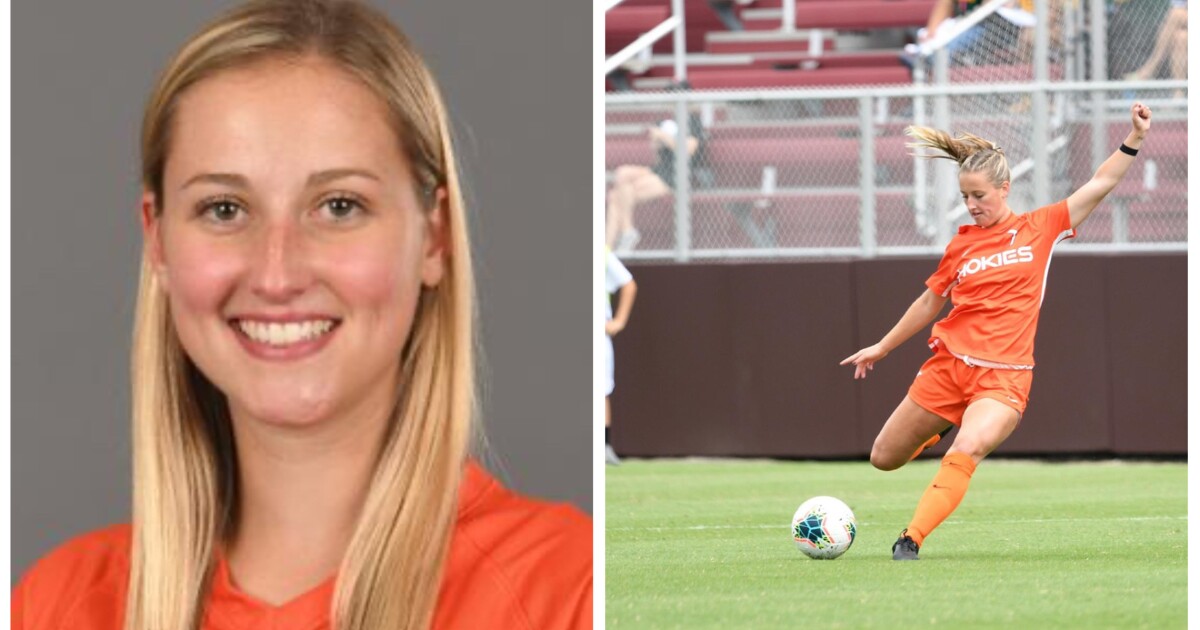

A judge this month declined to dismiss a lawsuit filed by a Virginia Tech women’s soccer player who says she was benched after she did not kneel in a pregame ceremony, building up to a legal battle that combines sports, cultural politics, and the First Amendment.
U.S. District Judge Thomas Cullen, an appointee of former President Donald Trump, rejected Virginia Tech’s bid to dismiss the case on Dec. 2, saying “genuine issues of material fact” existed that need to be decided by a jury, according to court records.
The lawsuit pits former player Kiersten Hening against the team’s coach Charles Adair, alleging that he became furious when she refused to kneel in support of social justice movements, primarily her objections to the Black Lives Matter organization’s mission statement.
NATIONAL WOMEN’S SOCCER TEAM KNEEL FOR NATIONAL ANTHEM AND WEAR ‘BLACK LIVES MATTER’ SHIRTS
After an Atlantic Coast Conference unity statement was recited over loudspeakers at Virginia Tech’s 2020 season opener, Hening remained standing while most of her teammates knelt on the field. Adair voiced his anger at her during halftime and then benched her until the end of the match, according to the lawsuit’s claims.
Following her removal from the starting lineup and getting little playing time during the subsequent two games, allegedly because she exercised her First Amendment rights from being compelled to kneel, Hening quit the team.
Adair claims in response to the lawsuit that he never saw Hening when she refused to kneel and that his actions were taken in response to her poor playing during the first half of the season-opening game with the University of Virginia.
“There is no evidence from anybody, other than a theory,” Virginia Tech’s attorney, Assistant Attorney General Hudson McClanahan, argued during a hearing. “That’s what got us here today — a theory.”
But Cullen wrote in his decision that a “fair review” of the records indicates there is “more than just a supposition. He added, “indeed, ample circumstantial evidence undergirds her claim and gives rise to genuine issues of material fact about Adair’s true motives and actions.”
Cullen also said there was important context surrounding what happened to the buildup of the unity statement and Hening’s decision to opt out of kneeling on the field.
“The Virginia Tech women’s soccer team, like many organizations and groups, was divided over whether and how to publicly support various social-justice issues (including BLM) in the aftermath of the murder of George Floyd,” according to Cullen’s 16-page opinion.
The judge added that Adair spoke of concerns about an “apparent rift” that formed in the team and made comments on several occasions voicing support for the BLM movement.
“All of this suggests that this apparent BLM- and social-justice divide was far more significant to Adair at the time than he would have the court believe today,” Cullen said, adding it was “no secret” that Hening was an outspoken conservative and supporter of Trump at the time.
But Cullen added that “Adair also contends that Hening’s theory of causation is, at bottom, based on rank speculation and self-serving conclusions.”
Hening’s attorney, Cameron Norris, said Adair took four substantial actions against his client in retaliation for her refusal to kneel. Norris said she was berated during the halftime of the UVA game, benched during the second half, was criticized later during a team meeting, and had playing time cut during the next two games.
Hening contends she supports social justice initiatives but does not believe in the BLM organization’s mission statement, which includes defunding police and criticizing the nuclear family framework, her lawsuit argues.
Cullen’s decision gives a small victory to Hening, who must ultimately prove to a jury that her account of events is correct.
CLICK HERE TO READ MORE FROM THE WASHINGTON EXAMINER
“Ultimately, Adair may convince a jury that this coaching decision was based solely on Hening’s poor play during the UVA game, but the court, viewing the evidence in the light most favorable to Hening, cannot reach that conclusion as a matter of law,” the district judge said.
The Washington Examiner contacted Hening and her attorney for a response.






